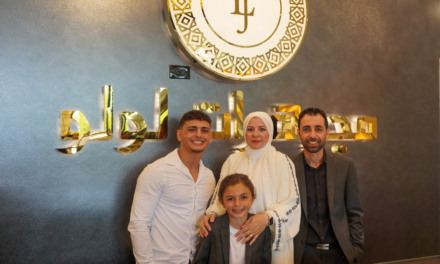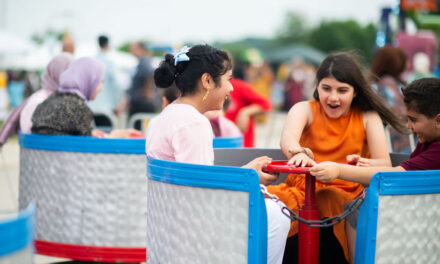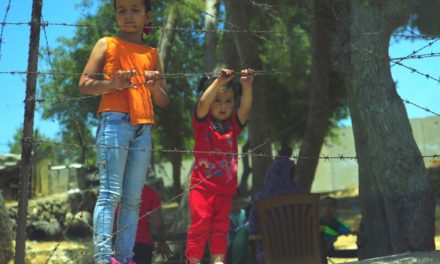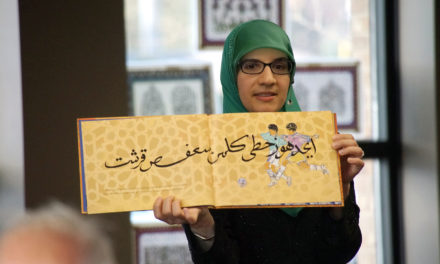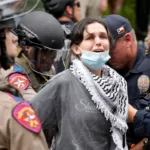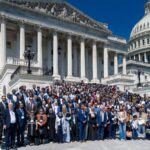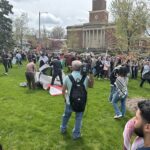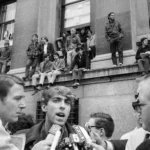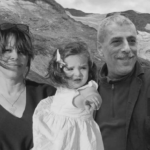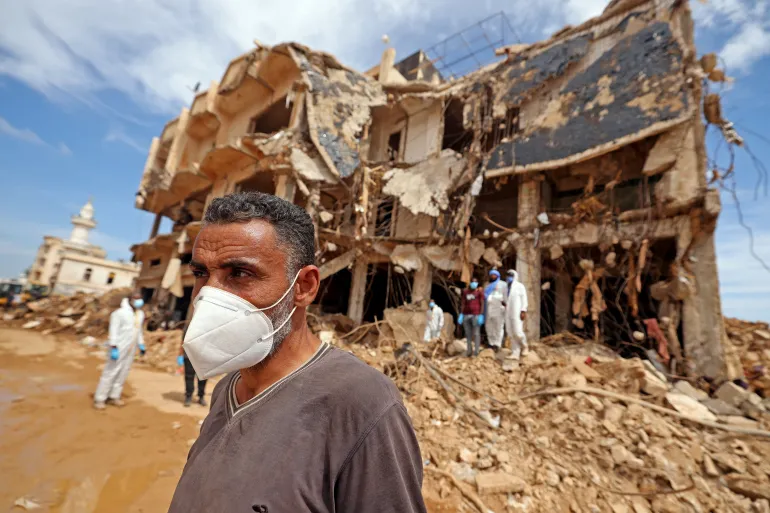
Photo by Karim Sahib of AFP
Rescue teams assist in relief work in Libya’s eastern city of Derna after deadly Storm Daniel.
Esayed Elbahbah spoke over the phone Sept. 10 with his sister Asha, who lived in Derna, Libya, where they had both grown up. A storm brewing in the Mediterranean had caused extensive flooding in Greece, Bulgaria and Turkey. Now it headed to the coast of Libya.
Elbahbah urged his sister to leave Derna, a city of about 100,000 situated in a coastal valley between two mountains. She didn’t want to leave her home, he told the Wisconsin Muslim Journal this week.
About four hours after they hung up, Storm Daniel pummeled Derna. Dams broke in the middle of the night and a surge of water decimated a quarter of the city. Photos of the aftermath of the deadliest and costliest Mediterranean cyclone in recorded history look like Armageddon.
With whole families buried in sludge or washed out to sea, accurate death tolls are not available. The World Health Organization confirmed 3,922 deaths in Derna and surrounding areas, using hospital records. The WHO also notes about 10,000 people are missing and more than 25,000 are displaced. However, the WHO expects those numbers to rise quickly, “given the magnitude of the crisis.”
Asha left before her home filled with water and the walls crumbled. She is now in Tripoli, where she is receiving the generous care of fellow Libyans on the other side of the country’s political divide, Elbahbah said.
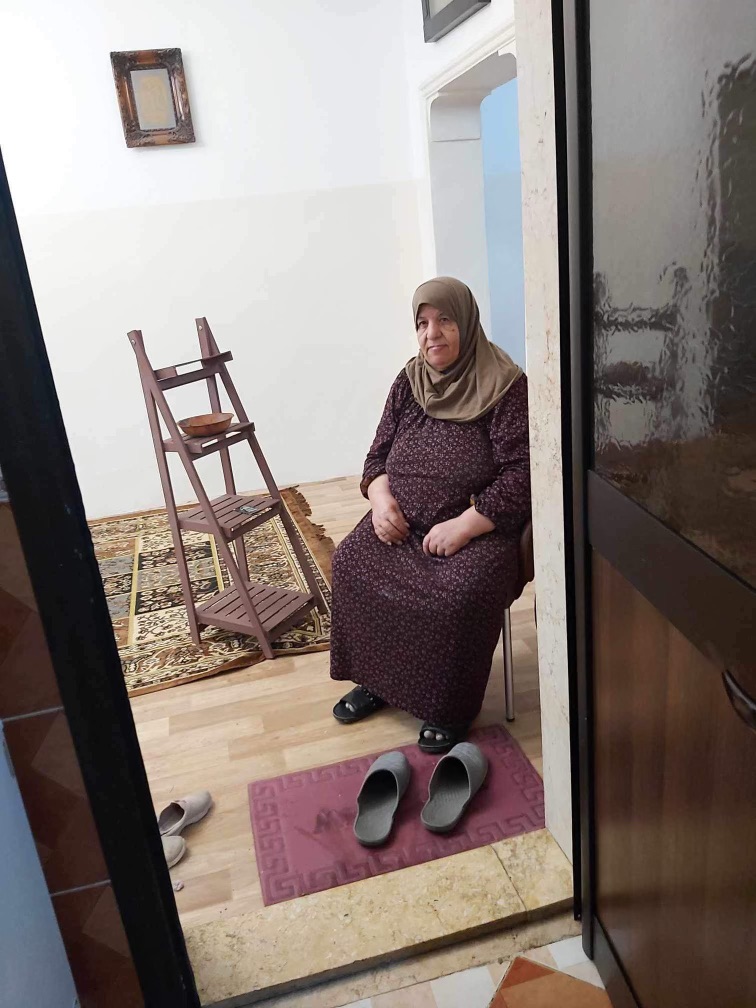
Esayed Elbahbah’s sister Asha in her home in Derna, Libya.
Thank God, he said. Yet his heart still hurts for so many who lost their lives, members of their families, their homes and everything they owned.
“I grew up there. I have a lot of friends who passed away in that disaster,” Elbahbah said. “Derna is very small. The population of the city and surrounding area is about 300,000. We have married each other, so there are a lot of cousins and cousins of cousins. Everyone is related to someone who died.”
Elbahbah, who lives in Ohio, is working closely with fellow Libyan American Organization members in Milwaukee to raise funds for victims of the flood. LAO Board of Trustees Chair Ali Hatab of Milwaukee and LAO member Mukhtar Suleiman of West Allis say they are grateful for the support of the Islamic Society of Milwaukee, which is hosting a fundraising dinner at 6 p.m. this Saturday. It will be held at Salam Elementary School, 815 W. Layton Ave., Milwaukee.
The Milwaukee Muslim community has already donated $50,000 last week after Friday prayers to support Libyan victims, Hatab noted. These early efforts address victims’ immediate needs for food, shelter, clothing and water. They will be followed by repairing destroyed neighborhoods and rebuilding lives, he said.
Hatab, Suleiman and Elbahbah spoke with the Wisconsin Muslim Journal Wednesday about the catastrophe in their homeland and their hopes for the future. ISM Board President Salah Sarsour talked about the Milwaukee Muslim community’s role in helping the victims.
Thinking of home
Hatab, Suleiman and Elbahbah have each made a life in America, yet they all keep close ties with family and friends back home, visiting as often as they can, they said.
“When one part of your body aches, the whole body aches along with it,” said Hatab has been active in the Libyan American Organization for many years. He has close friends in the organization who have lost family members in the flood. “We are in a state of shock and disbelief. I feel like I lost my own family members. It is heartbreaking.”
“One of my friends said her uncle, aunt, brothers and sisters, about 30 people in her family, were all killed,” Suleiman said.
Hatab , Suleiman and Elbahbah left Libya for higher education in the United States when they graduated from high school in the late 1970s. “Growing up over there, we were provided with a high-quality education and healthcare,” Hatab recalled. “People were very happy. When we left, things were going very well.
“Things changed over time after we left. The person running the country back then was a dictator and there was a steady decline. The morale of the Libyans isn’t getting any better with all that’s happening, even after the Arab Spring of 2011.”
Hatab raised a family in Milwaukee, where he built a career in education, serving as a teacher and an assistant principal in Milwaukee Public Schools, and as principal of Hoover Elementary School in West Allis for more than 16 years.
Suleiman has been living in Greater Milwaukee for 42 years and has been active in ISM since 1982, “when we were about 120 people who came to Friday prayer in the basement of a small elementary school.” An electrical engineer, he is now retiring after more than 29 years. Suleiman is from Misurata, about 200 miles away from Tripoli.
Elbahbah remembers playing soccer in the dried stream bed in Derna that had been cut off by two dams. “When it rains in the area, everything goes into the valley,” he explained. “There is a stream about 40 meters wide and 15 kilometers long. When the dams collapsed, the water went fast and took out everything in front of it.

Photo by Jamal Alkomaty of the Associated Press
The city of Derna, seen on Sept. 12, the day after horrific flooding.
“Derna was doomed by Gaddafi,” Elbahbah added. “For a long time, it was isolated, and not much development had taken place. That’s because some people there revolted and caused Gaddafi headaches most of the time.”
“I read in the news that the dam’s last maintenance was in 2002,” Suleiman said. “There is corruption so the money for the dam went to someone who didn’t take care of it. I think they should be held responsible, go to court and be sentenced for killing so many people and demolishing a city.”
“The problem we have is corruption over corruption over corruption.,” Elbahbah said. “Where do you start to investigate? Who do you punish? Who’s responsible? That issue is putting us behind and will not let us advance. I hope someday it can be resolved.”
Feeling hopeful
The support from Milwaukee’s Muslim community, the Libyan American community, Libyans themselves and the whole world creates a sense of hope, all three noted.

Ali Hatab of Milwaukee snapped a photo of family members in Tripoli, 2017.

Ali Hatab (second from right) visiting family in Tripoli in 2017.

A few of Ali Hatab’s family members in Tripoli in 2017.
“We are very humbled by the generosity of the ISM and all the different mosques around Milwaukee,” Hatab said.
The Libyan American Organization has been meeting at the state and national level to organize fundraising to buy supplies and pay for services in the recovery effort, Hatab said. “We will just keep connecting with each other as long as it takes.
“As Libyans residing in the United States, we are united in trying to provide all the support needed. It will be a sustained effort. We are also very aware of the corruption issues and will make sure donations through the Libyan American Organization will reach those who need it, eliminating any middleman and delivering supplies ourselves.”
To donate to the Derna flood victims through the non-profit Libyan American Organization, use this link.
“We thank all the countries that sent teams of experts and machinery to help find missing people,” Suleiman said.
And in Libya, a country divided by civil war for more than a dozen years is coming together to support the victims of this disaster. “We’re very hopeful this catastrophe that happened to us is now bringing all of our Libyan people together,” Suleiman said. “It is a very sad opportunity but an opportunity nonetheless.”

Ali Hatab of Milwaukee is the Libyan American Organization’s chair of the Board of Trustees
“We’re hoping the country will rebuild itself now,” Elbahbah said, “but that’s not really the main thing we need to build. We need to invest in the young people of Libya. We need to build the human beings themselves. That’s the most important part of this equation.”
“This is a terrible disaster but it really brought everybody together, uniting the people of East and West Libya,” he added. “People from the West came driving 10 or 15 hours to help.
“Second, there has been a lot of cooperation from people around the world. Hopefully, they will help rebuild Derna in the right way.”
“It is impossible to replace lost lives,” Hatab said. “We want to honor the dead, peace be upon them all. We want to be there for their families. We want the people of Libya to know their brothers and sisters are with them throughout this whole ordeal.”
“I hope Libya will one day be united under one government,” added Suleiman.
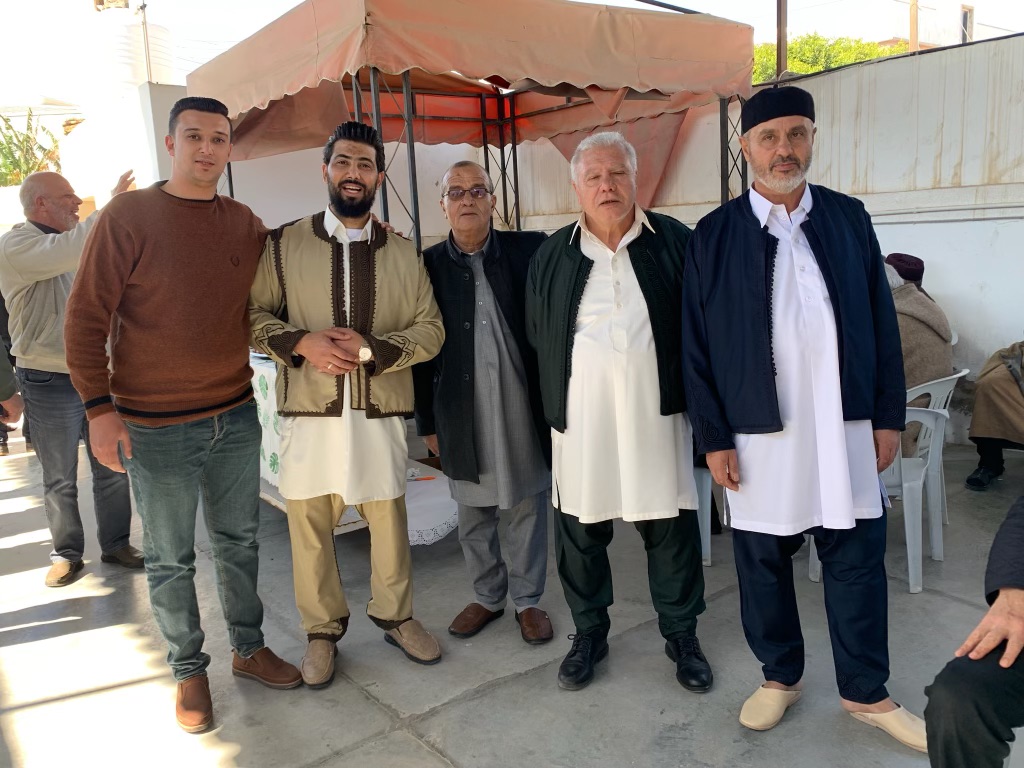
Mukhtar Suleiman of West Allis (second from right) poses with his brothers for a photo in Misurata, Libya, in March.
It’s our duty
“Our faith and values teach us to help victims of tragedies everywhere,” said ISM president Salah Sarsour. “For us, supporting victims of disasters is an important thing to do. And not just Muslim-majority countries. We helped victims in Haiti and Katrina, too. Wherever there is a calamity anywhere in the world, as a community we do what we can to support the victims.
“We send funds to organizations to buy supplies and provide services to initially meet their immediate needs for shelter, medical supplies, food and water. We do our due diligence to find out what is being done on the ground.”
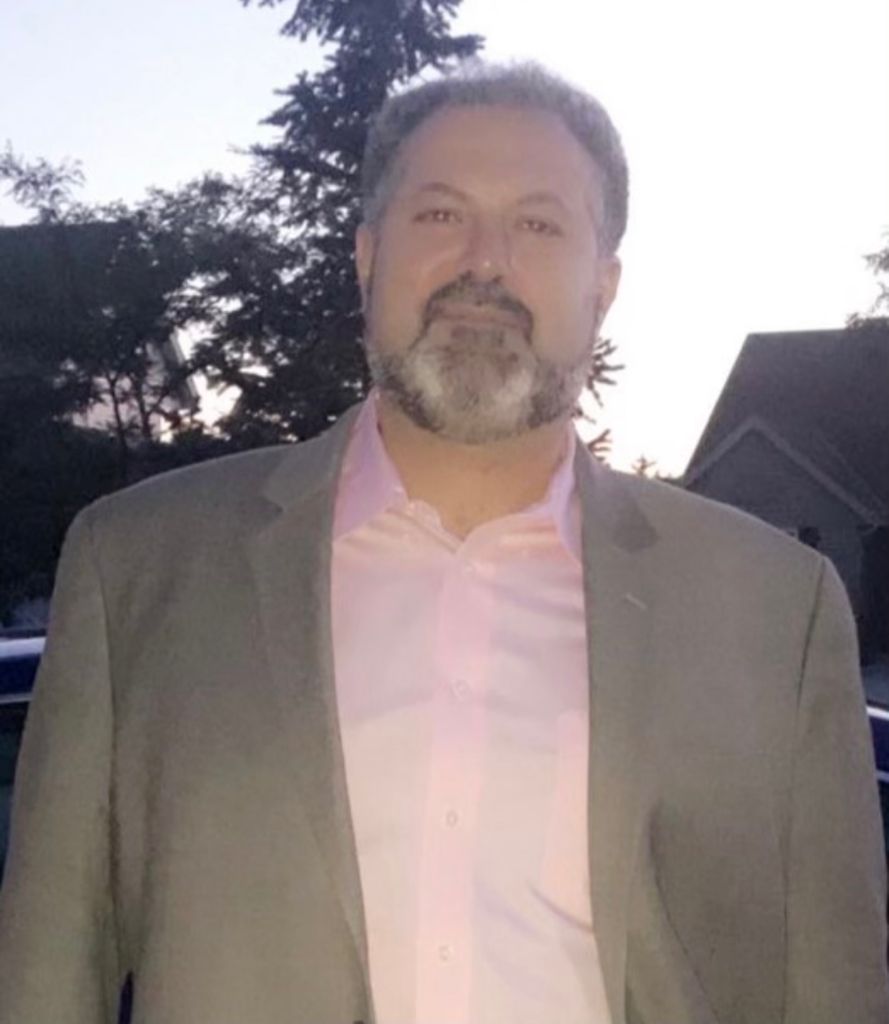
Islamic Society of Milwaukee president Salah Sarsour
ISM sends donations for Libya to Islamic Relief USA, a respected U.S.-based charity that began in 1993 providing disaster relief services. Working with Islamic Relief, an organization that can meet people’s needs directly on the ground, is important, Sarsour said. “Libya is a tough situation because there is no stable government with ongoing fighting between factions in the East and West.”
The Salam High School organization Ansar, which is Arabic for “support,” and ISM together organized Saturday’s fundraising dinner for victims of the earthquake in Morocco and the flood in Libya. ISM also collaborates with the Libyan American Organization in this effort, Sarsour said. Tickets are available here.
“We want to continue supporting the people until they are settled and in a good situation,” he added.
